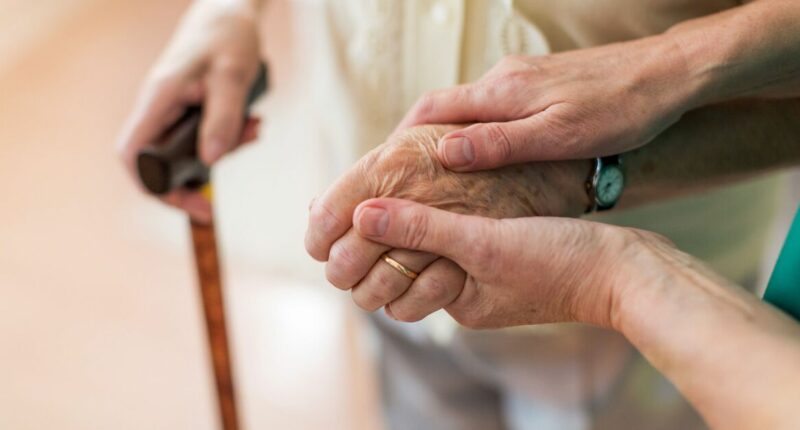Share this @internewscast.com
A simple skin swab based on the powers of ‘super smellers’ could detect devastating Parkinson’s disease up to seven years before symptoms appear. While scientists have known for years that dogs and some people have the amazing power to ‘sniff out Parkinson’s’ before symptoms appear no test has ever recreated it.
But now experts from the University of Manchester have found compounds in sebum – oil in human skin – contains tiny traces of chemicals that indicate a person could be in the earliest stages of Parkinson’s. The research, published in the journal npj Parkinson’s Disease, demonstrates that compounds or ‘volatiles’ found in sebum hold key biomarkers for identifying early Parkinson’s.
Using a technique known as Thermal Desorption-Gas Chromatography-Mass Spectrometry (TD-GC-MS), scientists at The University of Manchester, in collaboration with Salford Royal NHS Trust and the Medical University of Innsbruck, analysed skin swabs from participants with Parkinson’s, healthy volunteers, and those with a sleep disorder called isolated REM Sleep Behaviour Disorder (iRBD) — a known early warning sign of Parkinson’s disease.
The results showed that people with iRBD had distinct chemical profiles in their sebum that were different from healthy individuals, but not yet as pronounced as those with established Parkinson’s disease.
This supports the idea that Parkinson’s disease leaves a detectable trace on the body well before physical symptoms appear
Joy Milne – who has starred on TV programmes due to being a ‘super smeller’ and who inspired the research – was also able to distinguish swabs from people with iRBD from the control group and Parkinson’s patients.
Intriguingly, she was able to detect both diseases in two of the swabs that came from iRBD individuals, who were later diagnosed with Parkinson’s at their next clinical appointment, after sampling.
Professor Perdita Barran, Professor of Mass Spectrometry at The University of Manchester, said: “This is the first study to demonstrate a molecular diagnostic method for Parkinson’s disease at the prodromal or early stage.
“It brings us one step closer to a future where a simple, non-invasive skin swab could help identify people at risk before symptoms arise allowing for earlier intervention and improved outcomes.”
The study involved more than 80 participants, including 46 people with Parkinson’s, 28 healthy controls, and nine with iRBD.
They found 55 significant features in the sebum that varied between the groups.
Those with iRBD often showed levels that sat between the healthy controls and the Parkinson’s group, reinforcing the possibility of detecting the disease in its early phase.
Dr Drupad Trivedi, a researcher from The University of Manchester, built a model that examined the markers in a longitudinal sampling study.
He collected samples from Parkinson’s patients over a three-year period and found patterns that suggest this method can also be used to map the progression of the disease, which could have use in refining treatment options and improve patient outcomes.
Sebum is also easy to collect using gauze swabs from the face or upper back, making it ideal for non-invasive routine screening and regular monitoring.
Previous research by the team has also shown it does not need to be stored in the same cold conditions as other biofluids, such as blood, reducing associated costs.
The research is inspired by the observations of Joy Milne, prompting researchers at The University of Manchester to explore sebum as a source of diagnostic biomarkers.
By using mass spectrometry, a technique that measures the weight of molecules, they have found that there are distinctive Parkinson’s markers in sebum, which has led them to develop this non-invasive swab test.
These findings have recently been validated in another paper, published today in the Journal of Parkinson’s Disease, where trained dogs were able to detect Parkinson’s in the patients recruited by Prof Barren and Dr Trivedi with remarkable accuracy by smelling skin swabs.
Now, the researchers are continuing to develop and improve the sebum-based testing to eventually use as a practical tool in real-world clinical settings.
Dr Drupad Trivedi, Lecturer in Analytical Measurement Sciences at The University of Manchester, said: “Our goal is to develop a reliable, non-invasive test that helps doctors detect Parkinson’s earlier, track its progression, and ultimately improve patient outcomes.
“We’re also keen to hear from other hyperosmic individuals, potential ‘super smellers’ like Joy, whose remarkable sense of smell could help extend our work to detect other diseases with potential odour signatures.”
About 18,000 Britons are diagnosed with Parkinson’s every year, with more than 10million patients estimated to have the condition worldwide. The disease costs the NHS more than £725million a year.
Early signs of Parkinson’s include a tremor, stiffness, slowness of movement and loss of smell. Balance problems such as issues with coordination and muscle cramps are other common signs.
Parkinson’s is caused by the death of nerve cells in the brain that produce dopamine, a chemicals which controls movement. Experts are still working to uncover what triggers the death of these nerves.
But it’s thought that it’s due to a combination of genetic changes and environmental factors. Risk of developing the condition increases with age, with most patients diagnosed over 50.















